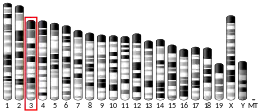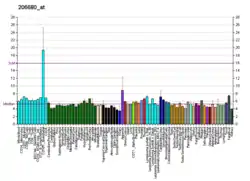CD5L
CD5 antigen-like is a protein that in humans is encoded by the CD5L gene.[5][6]
| CD5L | |||||||||||||||||||||||||||||||||||||||||||||||||||
|---|---|---|---|---|---|---|---|---|---|---|---|---|---|---|---|---|---|---|---|---|---|---|---|---|---|---|---|---|---|---|---|---|---|---|---|---|---|---|---|---|---|---|---|---|---|---|---|---|---|---|---|
| Identifiers | |||||||||||||||||||||||||||||||||||||||||||||||||||
| Aliases | CD5L, AIM, API6, PRO229, SP-ALPHA, Spalpha, CT-2, hAIM, CD5 molecule like | ||||||||||||||||||||||||||||||||||||||||||||||||||
| External IDs | OMIM: 602592 MGI: 1334419 HomoloGene: 55936 GeneCards: CD5L | ||||||||||||||||||||||||||||||||||||||||||||||||||
| |||||||||||||||||||||||||||||||||||||||||||||||||||
| |||||||||||||||||||||||||||||||||||||||||||||||||||
| |||||||||||||||||||||||||||||||||||||||||||||||||||
| |||||||||||||||||||||||||||||||||||||||||||||||||||
| |||||||||||||||||||||||||||||||||||||||||||||||||||
| Wikidata | |||||||||||||||||||||||||||||||||||||||||||||||||||
| |||||||||||||||||||||||||||||||||||||||||||||||||||
References
- GRCh38: Ensembl release 89: ENSG00000073754 - Ensembl, May 2017
- GRCm38: Ensembl release 89: ENSMUSG00000015854 - Ensembl, May 2017
- "Human PubMed Reference:". National Center for Biotechnology Information, U.S. National Library of Medicine.
- "Mouse PubMed Reference:". National Center for Biotechnology Information, U.S. National Library of Medicine.
- Gebe JA, Kiener PA, Ring HZ, Li X, Francke U, Aruffo A (Apr 1997). "Molecular cloning, mapping to human chromosome 1 q21-q23, and cell binding characteristics of Spalpha, a new member of the scavenger receptor cysteine-rich (SRCR) family of proteins". J Biol Chem. 272 (10): 6151–8. doi:10.1074/jbc.272.10.6151. PMID 9045627.
- "Entrez Gene: CD5L CD5 molecule-like".
External links
- Human CD5L genome location and CD5L gene details page in the UCSC Genome Browser.
Further reading
- Tissot JD, Schifferli JA, Hochstrasser DF, et al. (1994). "Two-dimensional polyacrylamide gel electrophoresis analysis of cryoglobulins and identification of an IgM-associated peptide". J. Immunol. Methods. 173 (1): 63–75. doi:10.1016/0022-1759(94)90284-4. PMID 8034987.
- Tissot JD, Sanchez JC, Vuadens F, et al. (2002). "IgM are associated to Sp alpha (CD5 antigen-like)". Electrophoresis. 23 (7–8): 1203–6. doi:10.1002/1522-2683(200204)23:7/8<1203::AID-ELPS1203>3.0.CO;2-1. PMID 11981870. S2CID 94662015.
- Strausberg RL, Feingold EA, Grouse LH, et al. (2003). "Generation and initial analysis of more than 15,000 full-length human and mouse cDNA sequences". Proc. Natl. Acad. Sci. U.S.A. 99 (26): 16899–903. Bibcode:2002PNAS...9916899M. doi:10.1073/pnas.242603899. PMC 139241. PMID 12477932.
- Clark HF, Gurney AL, Abaya E, et al. (2003). "The Secreted Protein Discovery Initiative (SPDI), a Large-Scale Effort to Identify Novel Human Secreted and Transmembrane Proteins: A Bioinformatics Assessment". Genome Res. 13 (10): 2265–70. doi:10.1101/gr.1293003. PMC 403697. PMID 12975309.
- Anderson NL, Polanski M, Pieper R, et al. (2004). "The human plasma proteome: a nonredundant list developed by combination of four separate sources". Mol. Cell. Proteomics. 3 (4): 311–26. doi:10.1074/mcp.M300127-MCP200. PMID 14718574.
- Zhang Z, Henzel WJ (2005). "Signal peptide prediction based on analysis of experimentally verified cleavage sites". Protein Sci. 13 (10): 2819–24. doi:10.1110/ps.04682504. PMC 2286551. PMID 15340161.
- Gerhard DS, Wagner L, Feingold EA, et al. (2004). "The Status, Quality, and Expansion of the NIH Full-Length cDNA Project: The Mammalian Gene Collection (MGC)". Genome Res. 14 (10B): 2121–7. doi:10.1101/gr.2596504. PMC 528928. PMID 15489334.
- Sarrias MR, Roselló S, Sánchez-Barbero F, et al. (2005). "A role for human Sp alpha as a pattern recognition receptor". J. Biol. Chem. 280 (42): 35391–8. doi:10.1074/jbc.M505042200. PMID 16030018.
- Gregory SG, Barlow KF, McLay KE, et al. (2006). "The DNA sequence and biological annotation of human chromosome 1". Nature. 441 (7091): 315–21. Bibcode:2006Natur.441..315G. doi:10.1038/nature04727. PMID 16710414.
This article is issued from Wikipedia. The text is licensed under Creative Commons - Attribution - Sharealike. Additional terms may apply for the media files.




